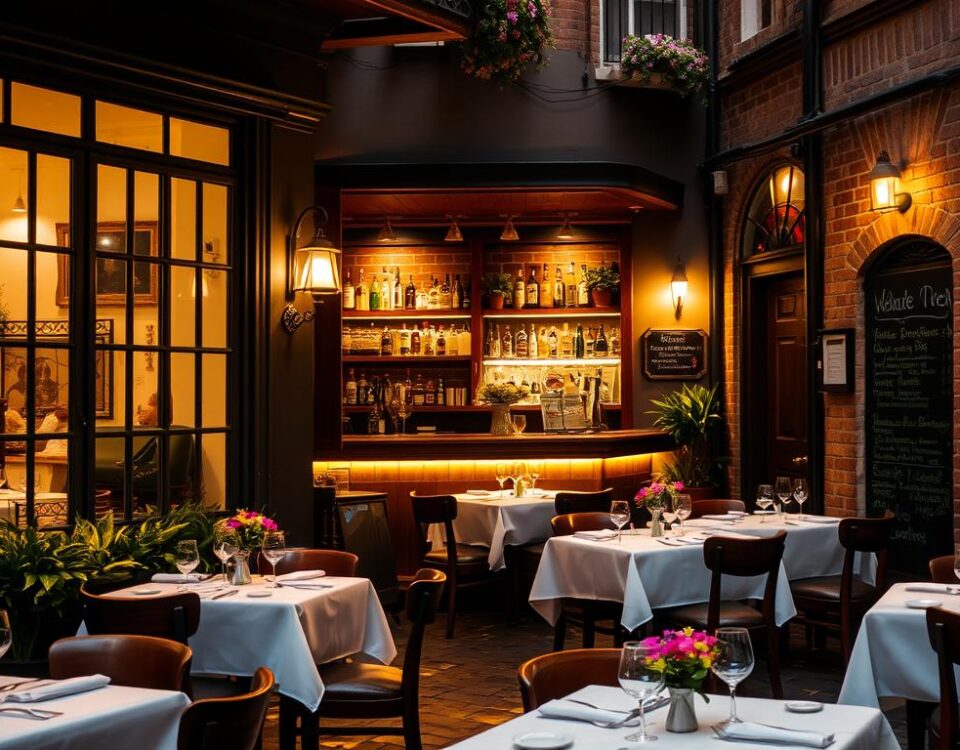
Top Steak-Cooking Mistakes Chefs Avoid for Perfect Texture
June 25, 2025
Executive Chef Salaries by State: Where Top Chefs Earn the Most in 2025
June 27, 2025The demand for personal chefs is on the rise, driven by increasingly busy lifestyles that leave many unable to devote significant time to meal preparation. As a culinary professional, I’ve seen firsthand the growing need for skilled chefs who can provide personalized cooking services.
The market size for this industry is predicted to increase by $21.7 billion by 2029, presenting a lucrative opportunity for those looking to start a career as a private chef. With the right training and experience, you can capitalize on this trend and build a successful business.
As we explore the world of private chef services, you’ll gain insights into the key factors that influence your income potential and learn strategies for attracting high-paying clients.
Key Takeaways
- Understand the growing demand for personal chefs and the potential for lucrative earnings.
- Learn the key differences between restaurant cooking and private chef work.
- Discover the importance of training and experience in building a successful private chef business.
- Gain insights into the factors that influence income potential as a chef.
- Develop strategies for attracting high-paying clients and building a successful business.
Understanding the Private Chef Industry
As a result of increasingly hectic lifestyles, many individuals are turning to private chefs to cater to their culinary needs. The demand for personal chefs is on the rise—the market size for this industry is predicted to increase by $21.7 billion by 2029. This growth is driven by various factors, including busy schedules and a growing interest in health-conscious eating.
What Does a Private Chef Do?
A private chef provides personalized culinary services to individuals or families, often in the comfort of their own homes. This can include meal planning, grocery shopping, and food preparation.Private chefs cater to the specific tastes and dietary needs of their clients, offering a tailored culinary experience. They may work with busy professionals, health-conscious families, or wealthy individuals who value the convenience and luxury of having a personal chef.
The Growing Demand for Personal Chefs
The growing demand for personal chefs can be attributed to several market trends. Changing lifestyles and busy schedules have created opportunities for private chefs to offer their services to different demographics. The pandemic has also shifted dining habits, creating new niches for in-home culinary services. As people continue to prioritize health and wellness, the demand for personal chefs is likely to persist.
- Busy professionals seeking convenient meal solutions
- Health-conscious families requiring tailored nutrition
- Wealthy individuals looking for luxury dining experiences
These client segments are driving the growth of the private chef industry, and understanding their needs is crucial for aspiring culinary entrepreneurs.
Essential Skills and Qualities for Success
To succeed as a private chef, you’ll need to possess a unique blend of culinary expertise and interpersonal skills. As a personal chef, you’ve been hired for more than just your food; you need to think about what your overall experience is going to look like for your clients.

Culinary Expertise and Creativity
A successful private chef must have a strong foundation in culinary arts, including knowledge of various cuisines, cooking techniques, and ingredient selection. Creativity is also essential, as you’ll need to develop innovative menus that cater to your clients’ tastes and dietary requirements. By staying up-to-date with culinary trends and experimenting with new recipes, you’ll be able to offer your clients a unique dining experience.
Business and Time Management Skills
Running a chef business requires more than just cooking skills; it demands effective business management and time management. You’ll need to manage your schedule, coordinate meal planning, and handle administrative tasks, all while maintaining a high level of culinary expertise. By prioritizing tasks, setting realistic goals, and staying organized, you’ll be able to deliver exceptional service to your clients and grow your business.
Interpersonal and Communication Abilities
As a private chef, you’ll work closely with clients in their personal spaces, making strong interpersonal and communication skills crucial. You’ll need to listen to their needs, understand their preferences, and communicate effectively about menus, ingredients, and pricing. By building rapport with your clients and being responsive to their needs, you’ll be able to establish long-term relationships and generate referrals, ultimately leading to a successful chef business. You’ll have to deal with a lot of people and be prepared for anything.
How to Become a Private Chef: Training and Experience
The journey to becoming a private chef involves both formal training and hands-on experience in the kitchen. As a personal chef, you’ll need to develop a range of skills to succeed in this competitive industry.
Culinary Education Options
Culinary education is a crucial step in becoming a skilled chef. You can explore various culinary schools that offer programs tailored to private chefs. These programs can range from certificate courses to degree programs in culinary arts.
When searching for culinary schools, consider factors such as curriculum, faculty expertise, and internship opportunities. Some renowned culinary institutions offer specialized courses in personal cooking, which can be beneficial for aspiring personal chefs.
Building Professional Kitchen Experience
Gaining experience in a professional kitchen is vital to becoming a successful private chef. You can start by working in restaurants, hotels, or catering services. This hands-on experience will help you develop the skills and confidence needed to manage your own kitchen.
As you gain experience, you’ll learn about kitchen management, food safety, and meal planning. You can also explore opportunities to work with experienced chefs who can mentor you and share their expertise.
Shadowing Established Personal Chefs
One of the best ways to gain insights into the world of private chefs is by shadowing established personal chefs. This experience can provide you with valuable insights into the daily life of a private chef and help you understand the nuances of running a chef business or personal chef business.
- Find mentorship opportunities with established private chefs in your area.
- Gain unique insights that you can’t learn in culinary school or restaurants.
- Approach potential mentors professionally and offer something in exchange for their guidance.
- Learn what specific questions to ask and observations to make when shadowing a private chef.
- Build relationships with experienced private chefs that can lead to referrals and collaboration opportunities.
Setting Up Your Personal Chef Business
Setting up your personal chef business is an exciting venture that demands attention to detail. As a private chef, you have the flexibility to choose how you operate, whether it’s cooking directly in clients’ homes or preparing meals in your own or a commercial kitchen.
Legal Requirements and Licensing
Before you start, it’s essential to understand the legal requirements and licensing needed to operate a personal chef business in your state. Research the specific regulations and licenses required, such as food handling certifications and business registrations. You can search for “personal chef business licenses” to find the necessary information.
Insurance and Food Safety Certifications
Insurance and food safety certifications are critical components of a personal chef business. Consider liability insurance to protect yourself and your business in case of food-related incidents. Food safety certifications, such as HACCP (Hazard Analysis and Critical Control Points), demonstrate your commitment to safe food handling practices.
Choosing Your Kitchen Setup
Deciding on your kitchen setup is a crucial decision. You can choose to cook in clients’ homes, use your own kitchen, or rent a commercial kitchen. Each option has its pros and cons. Cooking in clients’ homes can be convenient, but you may need to adapt to different kitchen setups. Using your own kitchen or a commercial kitchen provides more control, but may require additional equipment and storage.
When choosing your kitchen setup, consider the type of equipment you’ll need to invest in and what you can expect to use at client locations. Efficiently packing and transporting your cooking equipment between client homes is also essential. You may need to adapt to different kitchen setups and overcome common challenges in unfamiliar cooking spaces.
Developing Your Culinary Brand and Services
As a private chef, developing your culinary brand and services is crucial to attracting high-paying clients. This involves defining your cooking style, creating service packages, and building a portfolio that showcases your culinary expertise.
Defining Your Cooking Style and Specialties
To establish a strong culinary brand, you need to define your cooking style and specialties. This could be anything from specializing in vegan cuisine to mastering intricate dessert designs. Identifying your niche helps you stand out in a competitive market and attract clients who are looking for your specific expertise. Take the time to experiment with different cuisines and cooking techniques to discover what you’re truly passionate about and excel at.
Creating Service Packages and Pricing
Once you’ve defined your cooking style, it’s essential to create service packages that cater to different client needs and budgets. This could include à la carte services, full-service catering, or meal prep packages. When determining your pricing, consider factors such as ingredient costs, time, and the level of expertise required. Be sure to research your competition to ensure your pricing is competitive.
Building Your Portfolio and Sample Menus
Before you land your first client, it’s vital to practice creating menus that cater to various dietary needs and culinary preferences. Start by looking at sample personal chef menus and practice with those. Building a portfolio that showcases your culinary skills and creativity is crucial. This can include sample menus, photographs of your dishes, and testimonials from satisfied clients or family and friends who have tasted your cooking. Professional food photography can elevate your portfolio, but you don’t need an expensive camera to get great shots – good lighting and styling can make a significant difference.
By focusing on these key areas, you’ll be well on your way to developing a strong culinary brand and service offerings that attract high-paying clients. Remember, your brand is not just about the food; it’s about the experience you provide. By showcasing your unique style, versatility, and attention to detail, you’ll be able to differentiate yourself in a competitive market and build a loyal client base.
Marketing Your Private Chef Business
Once you’ve honed your cooking skills, the next step is to market your private chef business to discerning clients. Effective marketing is crucial to standing out in a competitive industry.
Building an Online Presence
A professional online presence is vital for attracting clients. Using website builders for chefs can help you create a visually appealing site that highlights your culinary skills. This is an opportunity to showcase your brand and services.
When building your website, focus on ease of navigation and clear calls to action. Potential clients should be able to easily find your services and contact information.
Networking and Finding Your First Clients
Networking is a powerful tool for finding your first clients. Attend culinary events, join professional organizations, and engage with other chefs to build relationships and generate referrals.
Don’t be afraid to reach out to friends, family, and acquaintances to spread the word about your business. Word of mouth can be a significant source of new clients.
Leveraging Social Media and Word-of-Mouth
Social media platforms offer a great way to showcase your culinary creations and interact with potential clients. Develop a social media strategy that highlights your unique dishes and cooking style.
Encourage satisfied clients to share their experiences on social media and leave reviews on platforms like Google. A lot of my customers tell me that they chose me because I was the top-reviewed chef in the area. To leverage word-of-mouth marketing, focus on creating memorable dining experiences that clients will want to share with others.
By implementing these strategies, you can effectively market your private chef business and attract new clients.
Working with High-Paying Clients
In my experience as a personal chef, I’ve found that delivering exceptional service is key to attracting and retaining high-paying clients. Over the years, I’ve learned that it’s not just about cooking; it’s about creating memorable experiences that keep clients coming back.

Understanding Luxury Client Expectations
High-paying clients often have high standards, and understanding their expectations is crucial. They may require personalized menus, special ingredients, or specific presentation styles. By being attentive to these details, you can tailor your services to meet their needs and exceed their expectations.
Creating Exceptional Dining Experiences
To stand out as a personal chef, you need to create dining experiences that are not just meals, but events. This can involve customizing menus based on clients’ preferences, using high-quality ingredients, and presenting dishes in an appealing way. By focusing on the overall experience, you can build a loyal client base.
Building Long-Term Client Relationships
Building long-term relationships with high-paying clients involves more than just cooking; it requires being responsive to their needs, handling feedback professionally, and maintaining a warm, yet professional, demeanor. By doing so, you can turn one-time clients into regular customers, ensuring a steady income stream for your business.
By implementing these strategies, you can not only attract high-paying clients but also retain them, leading to a successful and sustainable personal chef business. With a strong network of clients and a reputation for excellence, you can continue to grow your business over time.
Conclusion
The journey to becoming a successful private chef involves several key steps that can lead to a fulfilling career. To succeed, one must possess a combination of culinary expertise and business acumen.
As we’ve discussed, essential skills such as creativity, time management, and interpersonal abilities are crucial. Additionally, formal culinary training and experience in professional kitchens lay the groundwork for a thriving private chef business.
Developing a unique culinary brand and effectively marketing it are vital for attracting high-paying clients. By understanding the demands of the industry and dedicating oneself to delivering exceptional food experiences, you can build a loyal client base.
If you’re passionate about cooking and entertaining, becoming a private chef can be an extremely rewarding career choice. I encourage you to take the first step, whether it’s cooking for friends and family or shadowing established personal chefs, and start building your business today.
By following these steps and staying committed to your goals, you can turn your passion into a successful and lucrative chef business, allowing you to work on your own terms.
FAQ
What kind of training do I need to become a personal chef?
While formal culinary education is not always required, it can be beneficial in gaining the necessary skills and knowledge. Many personal chefs complete a culinary arts program or work under an experienced chef to gain hands-on experience.
How do I find clients for my personal chef business?
Building an online presence, networking with potential clients, and leveraging social media can help you find clients. You can also consider partnering with local food businesses or offering referral incentives to current clients.
What kind of insurance do I need as a personal chef?
As a personal chef, you should consider liability insurance and food safety certifications to protect yourself and your clients. You may also want to explore business insurance options to cover your equipment and kitchen setup.
How do I determine my pricing as a personal chef?
Your pricing will depend on factors such as your level of experience, the type of services you offer, and the level of luxury your clients expect. You can research industry standards and consider offering tiered pricing or package deals to attract clients.
Can I start a personal chef business from home?
While it’s possible to start a personal chef business from home, you may need to invest in commercial kitchen equipment and ensure your home kitchen meets local health and safety regulations. You may also need to consider renting a commercial kitchen space for certain events or services.
How do I manage my time effectively as a personal chef?
As a personal chef, you’ll need to juggle cooking, client communication, and business management tasks. Creating a schedule, prioritizing tasks, and using time-management tools can help you stay organized and efficient.
What are some common mistakes to avoid as a personal chef?
Common mistakes include underpricing your services, failing to plan for unexpected expenses, and not having a clear business plan. You should also be prepared to adapt to changing client needs and preferences.



